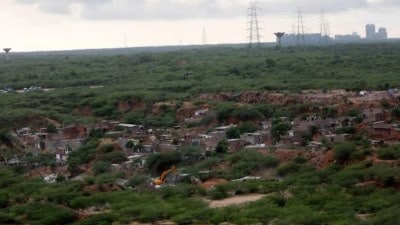IMB: Somali pirates close to Indian coast,attacks up by 40 pc
The failure of the UN and Western powers to stabilise Somalia and invest in its economy uniformly has seen piracy by its nationals soar by about 40 per cent in the Indian Ocean region in 2010.
The failure of the UN and Western powers to stabilise Somalia and invest in its economy uniformly has seen piracy by its nationals soar by about 40 per cent in the Indian Ocean region in 2010 and brought them to the edge of Indias western coast,the head of the International Maritime Bureau (IMB) said.
With the Indian Navy and Coast Guard arresting dozens of Somali pirates in two incidents in recent weeks and 17 Indian sailors taken hostage on an Italian tanker 550 nautical miles from the Indian coast on Tuesday,the situation has turned alarming,said Pottengal Mukundan,the India-born director of the London-based IMB.
The highly-armed pirates could pose a threat to cities on Indias western coast just like the Lashkar-e-Toiba terrorists who came by boat from Pakistan and attacked Mumbai in November 2008,and can also badly hurt Indias coastal ecology as they have the ability to hijack large vessels and wreck them in Indian waters,Mukundan told The Indian Express.
Over the last two weeks,the Indian Navy and Coast Guard have arrested 43 Somali pirates after gunbattles with them foiled their plans to hijack ships off Lakshadweep. While 15 pirates arrested in the first incident on January 28 have been brought to Mumbai and handed over to local police,another 28 held on February 6 are expected in the city this week.
The problem has definitely got worse in the Indian Ocean and Arabian Sea areas in 2010. The number of attacks have gone up by 40 per cent in these areas and the pirates are ranging further and further away from their coast, Mukundan said over the phone from Portugal. There is a need for very firm and robust action against them so that there is a deterrent effect,and we are delighted by the action taken by the Indian Navy recently as in our view,it is exactly the right thing to do.
In 2010,there were 219 attacks and 49 hijackings off Somalia and 1,016 crew were taken hostage. However,this year,there have been 34 attacks in the Indian Ocean region in January alone,Mukundan said. Even as we speak,there are 33 ships held by pirates in Somalia and over 700 crew are hostage. These are unprecedented levels, he added.
The pirates had moved south of the Horn of Africa,further into the Indian Ocean and further east of Somalia due to the sustained pressure of global naval forces in the Red Sea and Gulf of Aden region since late 2008 when the piracy problem blew up in the face of the global shipping industry. Somalia slipped into anarchy and has been in turmoil since the collapse of the Mohamed Siad Barre regime in 1991. The impoverished country is presently ruled by a transitional federal government whose authority is not fully effective.
During the height of the piracy problem in 2008,the marauders operated from mother ships which were basically large trawlers that launched smaller boats or skiffs to attack merchant vessels,and operated not too far from the Somali coast. But now they are commandeering some of the large ships that they have hijacked and converted them into mother ships,Mukundan said.
They can put many more pirates on these ocean-going vessels,it gives them greater capability and endurance at sea,and their target ships cannot suspect them until they launch smaller boats for an attack. Besides,they could have hostages on board and that makes it tough to take on such ships. This is a very serious escalation in technique.
Mukundan said that there was an urgent need for the UN and global powers to renew their focus on Somalia,particularly its south-central region which remained neglected and is contributing to the piracy menace. The foreign investment is going into the Somali land and Puntland in the north and northeast. What they need is investments in the south-central regions from where these pirates are coming. This is a forgotten part of Somalia,there has been no investment there for decades,there is nothing ashore and they are all going to sea, he said. We are not talking of very big ticket investments here. They need some clinics,schools,things that cost $20,000 or $30,000,some help. If we ignore them,all action taken against them at sea will be undermined.
Secondly,the arrested pirates need to be dealt with very severely,including those nabbed by India,Mukundan said. Big ocean liners are coming close to the Indian coast now to avoid pirates and the pirates are following them. There could be catastrophic environmental problems if the pirates board them. Which is why it is very important for the Indian Navy and Coast Guard to focus on this and take them out. And those nabbed cannot be sent back. They have to be tried and punished severely as their crimes are very serious.



- 01
- 02
- 03
- 04
- 05




























